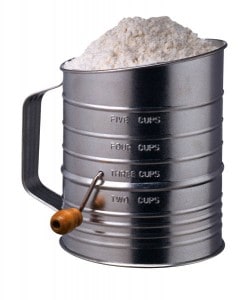 Q. Do alternative flours such as almond flour offer any real health advantages and if so (or if not), why?
Q. Do alternative flours such as almond flour offer any real health advantages and if so (or if not), why?
A. It’s hard to say that something is good for you based entirely on what it isn’t! Whether alternative flours offer any health advantages over wheat flour really depends on what you’re avoiding (and why), which ones you choose, and what you’re making.
Avoiding Gluten
For example, if you are gluten intolerant, then using a gluten-free flour instead of wheat flour definitely offers a significant health advantage! Be forewarned, however, that substituting gluten-free flour in recipes developed for wheat flour will yield a very different result. The gluten in wheat flour helps bread rise and is responsible for the chewy texture of wheat-based baked goods. It’s possible to compensate for the absence of gluten with other ingredients and techniques, but it’s tricky! Your best bet is to use recipes specifically developed for gluten-free flours rather than simply substituting alternative flours for wheat flour in your recipe.
See also
What Are You Using Instead?
Aside from avoiding gluten (which is only beneficial if you are gluten intolerant), any nutritional differences will depend on exactly which alternative you choose.
- Flours made from other cereal grains, such as rice, oats, buckwheat, millet, and so on, are roughly comparable to wheat flour. Note: Rice and oat flours tend to lower in protein and fiber than wheat flour.
- Flours (technically, meals) made from nuts and seeds, such as almond, hazelnut, and flax, will be lower in carbohydrates and higher in fats and, therefore, calories. Note: Coconut flour is the exception, being lower in fat and higher in fiber than most nut meals.
- Flours made from legumes, such as soy, garbanzo, and fava, tend to be higher in protein and lower in carbohydrates.
Obviously, which of these differences constitute a nutritional advantage depends on what you’re looking for. If you’re interested in reducing carbohydrates, for example, nut meals offer an advantage. But if you want to limit fat or calories, they wouldn’t necessarily be the best choice. And other than being gluten-free, rice and oat flour don’t seem to be much of an improvement over wheat flour, which is higher in protein and fiber.
What Are You Making?
Finally, what are you making with your alternative flour? A cake made with millet flour instead of wheat flour is still a cake, not a health food. Sweet treats and baked goods should be enjoyed in moderation, no matter what kind of flour they’re made with!
See also

Doing a gluten free daily is very difficult yeah! Its like, you have to sacrifice for everything you love to eat. I know there are ways how to cake them with gluten free but, the real ingredients are not their anymore so it means the real taste is not perfect at all! But having gluten free will help us maintain our body healthy!
My good human you do not have to just learn where to buy the good breads or baked goods that are gluten free as well as learning how to make things that are
still tasty and crisp.